The Evolution of Christopher Rice
 To say that Christopher Rice’s entry into the world of commercial fiction was made easier by his famous literary lineage would be both with and without merit. Certainly, his “Son of…” delineation afforded him access to major media outlets few debut writers even dream of in promoting their first books. But when it came to the words on the page – his words, his pages – it was this same flawed line of reasoning many skeptics used to dismiss Rice right out of the gate. After all, how could the then twenty-two year old offspring of gothic novel queen Anne Rice possibly be judged on his own merits without the inherent skepticism leveled at celebrity children attempting to step out on their own?
To say that Christopher Rice’s entry into the world of commercial fiction was made easier by his famous literary lineage would be both with and without merit. Certainly, his “Son of…” delineation afforded him access to major media outlets few debut writers even dream of in promoting their first books. But when it came to the words on the page – his words, his pages – it was this same flawed line of reasoning many skeptics used to dismiss Rice right out of the gate. After all, how could the then twenty-two year old offspring of gothic novel queen Anne Rice possibly be judged on his own merits without the inherent skepticism leveled at celebrity children attempting to step out on their own?
Answer: He couldn’t. And didn’t.
Despite his inability to avert the caustic red pen of critics, Rice managed to establish himself as a bonafide literary draw with his debut novel, 2000’s A Density of Souls. Set in the  familiar Rice turf of New Orleans, Density grabbed readers from page one with the story of four best friends and their ill-fated journey through high school and beyond. Fraught with adolescent jock lust, betrayal, murder, homophobia, and a shot of rape and incest for good measure, Density read like a gay, gothic Melrose Place and won the fledgling dark scribe legions of fans who helped the book shoot onto the New York Times bestseller list. The fact that in Rice’s fictional world the boy did indeed get the football player – or two or three – didn’t hurt his standing in the gay community either.
familiar Rice turf of New Orleans, Density grabbed readers from page one with the story of four best friends and their ill-fated journey through high school and beyond. Fraught with adolescent jock lust, betrayal, murder, homophobia, and a shot of rape and incest for good measure, Density read like a gay, gothic Melrose Place and won the fledgling dark scribe legions of fans who helped the book shoot onto the New York Times bestseller list. The fact that in Rice’s fictional world the boy did indeed get the football player – or two or three – didn’t hurt his standing in the gay community either.
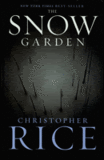 Rice followed up in 2002 with another atmospheric psychological thriller, The Snow Garden. More of the same, only this time set in a snowy, fictional New England-esque college town. Again, despite being an easy target for reviewers, Snow Garden went on to win the prestigious Lambda Literary Award for Gay Men’s Mystery and dispelled the notion that he was a one-hit wonder riding on his mother’s literary coattails.
Rice followed up in 2002 with another atmospheric psychological thriller, The Snow Garden. More of the same, only this time set in a snowy, fictional New England-esque college town. Again, despite being an easy target for reviewers, Snow Garden went on to win the prestigious Lambda Literary Award for Gay Men’s Mystery and dispelled the notion that he was a one-hit wonder riding on his mother’s literary coattails.
In 2005, just when Rice seemed to have established a proven formula for success, he made a conscious decision to distance himself from the gothic tone of his mother’s novels, doing an about face 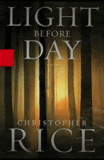 with his next novel, Light Before Day. Decidedly more mature in scope and execution, Light played more like a noiresque murder mystery, taking on both a first-person narrative and eschewing the atmospheric landscapes of his previous novels for the bright lights of West Hollywood. Fans were somewhat disarmed by the shift into crime fiction; critics – while still split – took notice. Rice seemed on his way toward leaving the days of fielding criticism about his advantaged literary background – real or perceived - behind.
with his next novel, Light Before Day. Decidedly more mature in scope and execution, Light played more like a noiresque murder mystery, taking on both a first-person narrative and eschewing the atmospheric landscapes of his previous novels for the bright lights of West Hollywood. Fans were somewhat disarmed by the shift into crime fiction; critics – while still split – took notice. Rice seemed on his way toward leaving the days of fielding criticism about his advantaged literary background – real or perceived - behind.
Three years and a new publisher later, Rice is preparing to put his eager fans to the test yet again. Blind Fall, the first of two books he’s under contract to write for Simon & Schuster imprint Scribner, continues down the straightforward thriller avenue he traveled with Light, with one glaring difference: a heterosexual protagonist. Yikes.
As he preps for his cross-country book tour in support of Blind Fall, Rice sits down with Dark Scribe Magazine to discuss sexuality and the thriller genre, the distractions of political controversy, and what surprised him about the fallout from his mother’s switch from vampires to religious fiction.
Dark Scribe Magazine: Let’s start with Blind Fall. Fans have been waiting a long time for the new book. Tell us what it’s about.
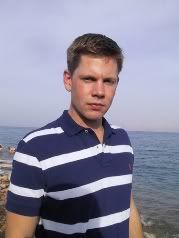 Christopher Rice: It seems like I’m always keeping my poor fans waiting and for that I apologize. But this was, without a doubt, the most challenging book I’ve written and I needed every minute of time I took to make sure it was as solid as it could be. Blind Fall is told entirely from the point of view of a straight, battle-scarred Force Recon Marine named John Houck who discovers that the comrade who saved his life in Iraq was secretly gay. And John discovers this after the Marine in question is gruesomely murdered. Together with the boyfriend his comrade kept secret, John not only seeks justice for his close friend but strives to overcome his own homophobia. I like to joke that John is my first truly straight character – meaning he doesn’t suddenly fall in love with a character who bears a physical resemblance to yours truly halfway before the novel is through. On a more serious note, the time I took to write it was primarily devoted to getting into the character of John Houck, almost like an acting exercise. Making sure he spoke with Marine Corps authenticity was just the beginning. I had to adopt attitudes and a mind-set that were convincing to a reader but not necessarily my own.
Christopher Rice: It seems like I’m always keeping my poor fans waiting and for that I apologize. But this was, without a doubt, the most challenging book I’ve written and I needed every minute of time I took to make sure it was as solid as it could be. Blind Fall is told entirely from the point of view of a straight, battle-scarred Force Recon Marine named John Houck who discovers that the comrade who saved his life in Iraq was secretly gay. And John discovers this after the Marine in question is gruesomely murdered. Together with the boyfriend his comrade kept secret, John not only seeks justice for his close friend but strives to overcome his own homophobia. I like to joke that John is my first truly straight character – meaning he doesn’t suddenly fall in love with a character who bears a physical resemblance to yours truly halfway before the novel is through. On a more serious note, the time I took to write it was primarily devoted to getting into the character of John Houck, almost like an acting exercise. Making sure he spoke with Marine Corps authenticity was just the beginning. I had to adopt attitudes and a mind-set that were convincing to a reader but not necessarily my own.
Dark Scribe: Where did the inspiration for Blind Fall come from? 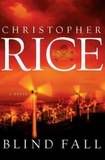
Christopher Rice: Years ago, before my first novel A Density of Souls, was published, I came up with an idea for a screenplay – what if a gay couple was hideously gay-bashed, and what if one member of the couple, the one who died, turned out to be a Marine? Would his Marine Corps buddies seek revenge? How would they respond to this boyfriend they never knew about? I was at a very different point in my creative development so the idea took the shape of a high-concept action thriller. And at the time, I never saw it as being right for a novel, and novels took over for me just a short time after the idea came to me. So I put it away for a while. Even though I had technically shelved the idea, I kept meeting gay military men – out in West Hollywood, when I was on book tour – and I would usually give them a rough sketch of this idea I had. Some of them liked it; some of them thought it was absurd. So it kept being brought back up for me. Then when I was out on the road promoting Light Before Day, my last book, it just sort of came to me – “This is what you’re doing next.”
Dark Scribe: Was making the Iraqi war a backdrop for Blind Fall a way of channeling your feelings over the country’s real-life situation in Iraq?
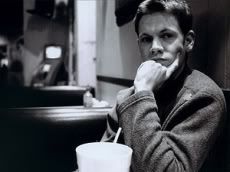 Christopher Rice: Maybe. But when I realized this was the book I was doing next, the geopolitics associated with the idea almost frightened me away from it. Before 9/11, I saw this as a story that would explore what it means to be a Marine, what it means for your sense of masculinity and your sense of personal duty and honor. I had been excited about exploring those ideas without the distraction of politically controversial issues. And because I knew the novel would have a gruesome murder at its core, I didn’t want the horrors of war a post-9/11 John would have to experience to eclipse that murder or seem gratuitous by comparison. On another level, because I ultimately decided to tell the entire story from John Houck’s point of view, I didn’t have a venue for expressing my true political feelings in the narrative itself. Given that this character needed to overcome his homophobia, it would lower the stakes too much to have turned him anti-war at the beginning of the novel. Or worse, it would be too busy and distracting to have him become anti-war and less homophobic in the course of a single streamlined thriller. Also, most of the Marines I interacted didn’t express to me any political opinions about the war – they found the idea of expressing an opinion either right or left to be against their mission. What was most important to them is that they executed the orders they were given and that they served the commander-in-chief that the country brought to power.
Christopher Rice: Maybe. But when I realized this was the book I was doing next, the geopolitics associated with the idea almost frightened me away from it. Before 9/11, I saw this as a story that would explore what it means to be a Marine, what it means for your sense of masculinity and your sense of personal duty and honor. I had been excited about exploring those ideas without the distraction of politically controversial issues. And because I knew the novel would have a gruesome murder at its core, I didn’t want the horrors of war a post-9/11 John would have to experience to eclipse that murder or seem gratuitous by comparison. On another level, because I ultimately decided to tell the entire story from John Houck’s point of view, I didn’t have a venue for expressing my true political feelings in the narrative itself. Given that this character needed to overcome his homophobia, it would lower the stakes too much to have turned him anti-war at the beginning of the novel. Or worse, it would be too busy and distracting to have him become anti-war and less homophobic in the course of a single streamlined thriller. Also, most of the Marines I interacted didn’t express to me any political opinions about the war – they found the idea of expressing an opinion either right or left to be against their mission. What was most important to them is that they executed the orders they were given and that they served the commander-in-chief that the country brought to power.
Dark Scribe: As an out and proud thriller writer, you’ve included gay characters in your previous novels. Will Blind Fall continue this trend?
Christopher Rice: Yes, absolutely. But the predominant point-of-view here is the straight one. I was bored with writing from the gay point-of-view after three novels, but I wasn’t ready to put aside gay characters and themes that are of impact to gay readers.
Dark Scribe: Why is it important for you to include gay characters in your work? Are you worried that regularly including gay characters will someday limit you with your gay fans when you may want to write something without any?
Christopher Rice: I don’t know if it’s important for me to keep including gay characters. It’s just something I do. But in all honesty, fiction is my beat. Not politics. I don’t want to be tied to an agenda in my novels, ever. I’m on the Board of Directors for The Lambda Literary Foundation which celebrates LGBT writing – that is writing that depicts and explores 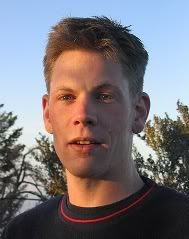 the LGBT experience, regardless of its source - but the term gay writer is one that I approach with great skepticism because it moves from an assessment of “the person behind the curtain” to the work, rather then going in the other direction, which is how I think it should be. In my personal life, I am a high profile member of the gay community and my columns for The Advocate represent my personal and political opinions as such. I love John Houck and I worked hard to make him convincing and sympathetic, but I don’t share all of his political opinions and my job is to make sure that doesn’t show in the novel itself. In general, I want my novels to be a free-for-all zone, for lack of a better term. I want them to be a place where imagination and passion govern, not politics. Naturally I’m going to engage “issues” now and then in my novels, as I do with gay Marines in Blind Fall, but in a novel, I usually have political arguments end in a stale-mate between rival characters.
the LGBT experience, regardless of its source - but the term gay writer is one that I approach with great skepticism because it moves from an assessment of “the person behind the curtain” to the work, rather then going in the other direction, which is how I think it should be. In my personal life, I am a high profile member of the gay community and my columns for The Advocate represent my personal and political opinions as such. I love John Houck and I worked hard to make him convincing and sympathetic, but I don’t share all of his political opinions and my job is to make sure that doesn’t show in the novel itself. In general, I want my novels to be a free-for-all zone, for lack of a better term. I want them to be a place where imagination and passion govern, not politics. Naturally I’m going to engage “issues” now and then in my novels, as I do with gay Marines in Blind Fall, but in a novel, I usually have political arguments end in a stale-mate between rival characters.
Dark Scribe: Crime fiction and thrillers are traditionally largely heterosexual genres. Why do you think you’ve been able to successfully buck this trend and flourish within the genre?
Christopher Rice: Well, let’s not forget trail-blazers like Katherine V. Forrest, John Morgan Wilson, Joseph Hansen and Michael Nava. And then there are a lot of lesbian crime writers who have achieved mainstream acceptance. To be honest, one of the things that drew me to crime fiction was that many of its straight, mainstream writers were depicting fully realized, complicated, and yes, sometimes villainous gay characters in their work. I still remember the day I picked up a Jonathan Kellerman novel on a whim and was blown away by the fact that Alex Delaware’s right hand man, Det. Milo Sturgis, was an openly gay man, and it wasn’t an issue for anyone else in the book. My personal experience has taught me that the mystery writing community can be a very warm and accepting place, regardless of your sales figures or your sexuality. Some of my closest friendships today were forged when I took my first steps out of my office and into the larger mystery community, something I did by attending conventions like Boucheron and Left Coast Crime and the West Hollywood and Los Angeles Times Book Festivals.
Dark Scribe: I remember reading an old interview you did with Tony Buchsbaum for January Magazine back in October of 2000 when Density of Souls first came out. There was a rather portentous moment during the interview when Tony mentioned that he had read somewhere that the city of New Orleans would be buried underwater in ten years. It was a light moment in reference, of course, to the denouement in Density in which the city is besieged by a hurricane. When Hurricane Katrina hit five years later, did those scenes from your book come immediately to mind?
 Christopher Rice: In all honesty, when I was growing up in New Orleans, we would all talk about the terrifying prospect of a monster hurricane drowning the city in the same way that Californians imagine the “the big one.” And I think it’s important to repeat here, and everywhere, that Katrina was not the worst case scenario that remains all too probable. So I should say it didn’t take a great deal of artistic invention to come up with the idea of having a hurricane slam into the city in the first place. However, the storm I depicted in my book was actually a river hurricane, meaning a storm that hit the mouth of the Mississippi and traveled its path right into the city, bringing most of the river with it in the form of storm surge. Based on what I know – and I don’t have a doctorate – this would be a far more devastating storm than Katrina was, as a hard as that may be for many people to believe. Ultimately, Katrina was a man-made disaster and the storm in Density is depicted as coming directly from God. So to answer your original question, I feel my fictional hurricane is far removed – thematically, for sure – from the human realities of Katrina and its aftermath.
Christopher Rice: In all honesty, when I was growing up in New Orleans, we would all talk about the terrifying prospect of a monster hurricane drowning the city in the same way that Californians imagine the “the big one.” And I think it’s important to repeat here, and everywhere, that Katrina was not the worst case scenario that remains all too probable. So I should say it didn’t take a great deal of artistic invention to come up with the idea of having a hurricane slam into the city in the first place. However, the storm I depicted in my book was actually a river hurricane, meaning a storm that hit the mouth of the Mississippi and traveled its path right into the city, bringing most of the river with it in the form of storm surge. Based on what I know – and I don’t have a doctorate – this would be a far more devastating storm than Katrina was, as a hard as that may be for many people to believe. Ultimately, Katrina was a man-made disaster and the storm in Density is depicted as coming directly from God. So to answer your original question, I feel my fictional hurricane is far removed – thematically, for sure – from the human realities of Katrina and its aftermath.
Dark Scribe: Following Hurricane Katrina, you wrote a beautiful column for The Advocate, in which you struggled to make sense of the tragedy and assessed the city’s capacity for rebuilding. In that piece, you wrote: “ To have lived there for an extended period of time is to enter into a strange contract with it - an agreement to become part of a place with a cultural identity so big and genuine that it will always eclipse your own, to become someone who is willing to articulate the city's mythos to the wide-eyed traveler who has never been there.” Do you feel that Christopher Rice, the author, will always be associated with New Orleans? Has setting subsequent books in other locales been a conscious effort to detach yourself from the mythos of that city?
Christopher Rice: I feel if anything that I have become far more associated with California in my writing and that New Orleans remains Mom’s territory. Yes, it’s been a conscious effort to detach but it was driven far more by personal motivations - an emotional need to get out of the south and move beyond the literal landscape of my adolescence and a hunger for the west coast. I crave the light here, and the clear dry air and the open space and the big sky. All these things have a powerful effect on my creativity, and my soul for that matter.
Dark Scribe: Have we done enough, as both a country and as individuals, to help the Hurricane Katrina survivors?
Christopher Rice: I don’t have the answer to that question. I think the administration’s response to the disaster will remain one of our greatest national tragedies. But I hadn’t lived in New Orleans for four years when the storm hit and I have not been forced to live through the day-to-day of its aftermath. When I visited recently, I saw a great sense of frustration and hopelessness among the people I talked to, a sense that too many people – people who could have made valuable contributions to the city’s rebirth - were fleeing the city during its reconstruction for it to ever really get a foothold again. I hold out hope that the city’s progress will travel unexpected paths.
Dark Scribe: Inevitably, much ado has been made of your famous literary lineage – with your mother being Anne Rice, the best-selling accomplished novelist, and your late father, Stan Rice, being an accomplished poet. At what point did you feel that you had stepped out and into your own? Or haven’t you yet?
Christopher Rice: By my own estimation, I stepped out onto my own when I wrote a second novel. I’m not referring to the fact that it too was a best-seller. The remarkable thing about The Snow Garden to me is that I actually finished the damn thing without going out of my second. I think everyone has a novel in them – but they only have one novel in them – one seething, all-over-the-place manuscript that’s been simmering in them all of their lives. Vomiting it onto paper isn’t so hard. But sitting down a second time and trying to actually build a story from the ground up without that life-long impulse driving your every move - that was incredibly hard work. After I completed The Snow Garden, I felt branded. I was a writer now. Whether or not others believe I have stepped out of my mom’s shadow is something for them to discuss amongst themselves.
Dark Scribe: Speaking of both your mother and much ado, it’s been fascinating to follow your mom’s spiritual reconnection with her Christian roots and subsequent career evolution. I think it would be an understatement to say that some critics and fans have not been very gracious to her across Internet circles. Is the danger of fan expectation something you worry about as an artist?
Christopher Rice: I feel my fans have been generous with me. They’ve allowed me to move more into the 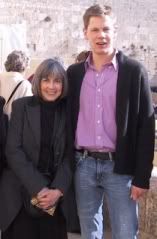 mystery/thriller genre in terms of how my stories are structured and they’ve made it clear to me that what hooks them about my novels are the characters. That was great news to me, because that’s ultimately where the heart of each book is for me as well. With Stephen and Kathryn and Adam and so on.
mystery/thriller genre in terms of how my stories are structured and they’ve made it clear to me that what hooks them about my novels are the characters. That was great news to me, because that’s ultimately where the heart of each book is for me as well. With Stephen and Kathryn and Adam and so on.
Dark Scribe: But why the brouhaha and personal attacks? Are you surprised by the ferocity of some of these reactions? Are fans simply mourning the fact that the vampires and witches of Anne Rice’s literary realm are dead?
Christopher Rice: No, I’m not surprised. I thought she should hire bodyguards before Christ the Lord came out, but I thought it would be the Christians who came after her, not the non-believers, who have, in many instances, proved themselves to be as bigoted and intolerant of other people’s opinions and beliefs as the most fundamentalist Evangelicals. Make no mistake. I absolutely believe in the separation of church and state in this country and I stand firmly against any religious institution that seeks to limit my civil rights as an out gay man. But it’s important for me not to lump decent people of faith in with those figures who actively seek to discriminate against me. My mother may be a Catholic, but she is an amazingly progressive one. She demands that the church recognize gay marriages as sacrament which is further than I’m willing to go in my own campaign for marriage equality. Anyone who has implied that her faith had somehow made her narrow-minded is flat out wrong in their assertions.
Dark Scribe: Seven or so years into your literary career, what would you say is the most important lesson you’ve learned along the way?
Christopher Rice: Write now. Edit later.
Dark Scribe: Any plans to revisit the previous novels with continuations of any of those stories or characters?
Christopher Rice: Not at this time.
Dark Scribe: Film adaptations. Which one of your novels would you most like to see brought to the screen one day? Anyone in particular on the casting wish list?
Christopher Rice: Blind Fall is the one I would most like to see hit the big screen, and I think Matt Damon would be a great choice for John Houck.
Dark Scribe: What’s next for Christopher Rice, the author? Can you give fans a hint about the next novel?
Christopher Rice: You know, I’ve given these little teasing glimpses and what happens is I always end up drastically changing course and people start asking me, “What happened to that sequel to The Snow Garden set in Bali?” So I’m going to keep my mouth shut for the time being. But I will say that I left the country for two and a half weeks in January on a research trip for my fifth novel.
To learn more about Christopher Rice, visit his official author website.
Read DSM's review of Blind Fall.
Photo Credits: #1 gwen & eddie photography;
#2 and #6 Anne Rice;
#3 and #5 Brian Orter
#4 Christopher Rice
In His Own Words...




Reader Comments